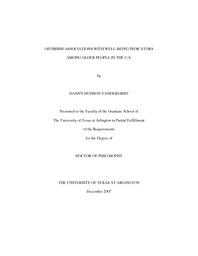
ATTENTION: The works hosted here are being migrated to a new repository that will consolidate resources, improve discoverability, and better show UTA's research impact on the global community. We will update authors as the migration progresses. Please see MavMatrix for more information.
Show simple item record
| dc.contributor.author | Vandergriff, Danny Hudson | en_US |
| dc.date.accessioned | 2008-04-22T02:41:14Z | |
| dc.date.available | 2008-04-22T02:41:14Z | |
| dc.date.issued | 2008-04-22T02:41:14Z | |
| dc.date.submitted | November 2007 | en_US |
| dc.identifier.other | DISS-1876 | en_US |
| dc.identifier.uri | http://hdl.handle.net/10106/696 | |
| dc.description.abstract | Introduction
This study is an analysis of associations between optimism and other psychological well-being indicators among people over age 65 in the U.S. The analysis is based on a stratified random sample collected in 2001 (Wave 1) with a 2004 follow up (Wave 2). The original survey was restricted to African American and Caucasian respondents who were "Christian." The purpose of this study is to provide social workers a better understanding of the function of well-being, particularly optimism, among older people.
Literature Review
Literature comparing well-being indicators to optimism among older populations is very limited. There are a few studies that compare older and younger groups in their level of well-being, and some include optimism as an indicator of well-being. However, few existing studies attempted to control for more than one or two well-being indicators as when considering optimisms' association to particular components of well-being.
Methods
Using an existing database, baseline demographics and well-being indicators were compared in chi-square and multiple regression equations to consider relationships between optimism, the demographics and other well-being indicators. Baseline demographics and well-being indicator scores, including optimism, were then compared to changes in other indicator scores between Wave 1 and Wave 2. Finally, baseline demographics and well-being indicator scores were compared to Wave 2 scores to determine which most strongly predicted future scores in optimism and the other well-being indicators.
Data Analysis and Implication
The baseline comparison all of the well-being indicators, except depression, had significant associations with optimism. However, only self-reported health, forgiveness of others and self-esteem predicted changes in optimism over time or future optimism independent of baseline optimism. Additionally, perceived personal control, self-esteem and death anxiety appeared to influence changes in optimism scores indirectly through baseline optimism scores. | en_US |
| dc.description.sponsorship | Jordan, Catheleen | en_US |
| dc.language.iso | EN | en_US |
| dc.publisher | Social Work | en_US |
| dc.title | Optimism Associations With Well-being Indicators Among Older People In The U.S. | en_US |
| dc.type | Ph.D. | en_US |
| dc.contributor.committeeChair | Jordan, Catheleen | en_US |
| dc.degree.department | Social Work | en_US |
| dc.degree.discipline | Social Work | en_US |
| dc.degree.grantor | University of Texas at Arlington | en_US |
| dc.degree.level | doctoral | en_US |
| dc.degree.name | Ph.D. | en_US |
| dc.identifier.externalLink | https://www.uta.edu/ra/real/editprofile.php?onlyview=1&pid=387 | |
| dc.identifier.externalLinkDescription | Link to Research Profiles | |
Files in this item
- Name:
- umi-uta-1876.pdf
- Size:
- 523.8Kb
- Format:
- PDF
This item appears in the following Collection(s)
Show simple item record


